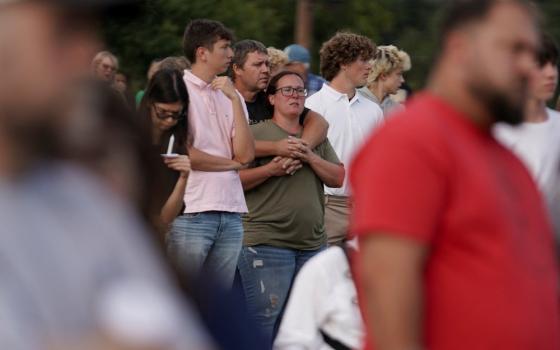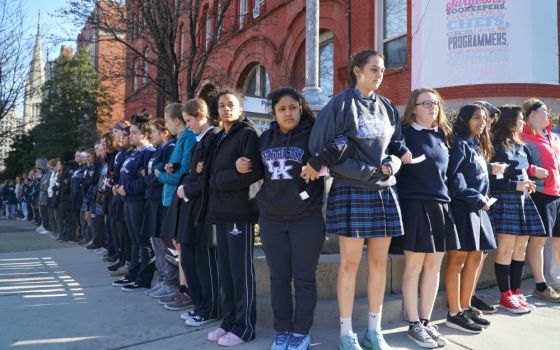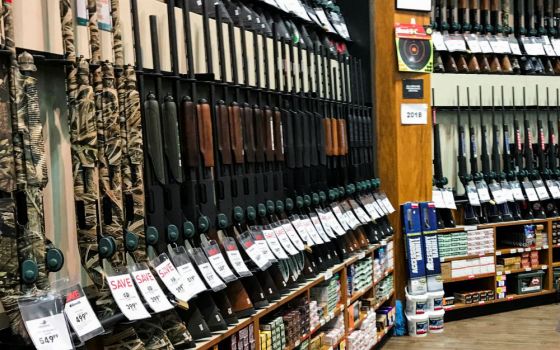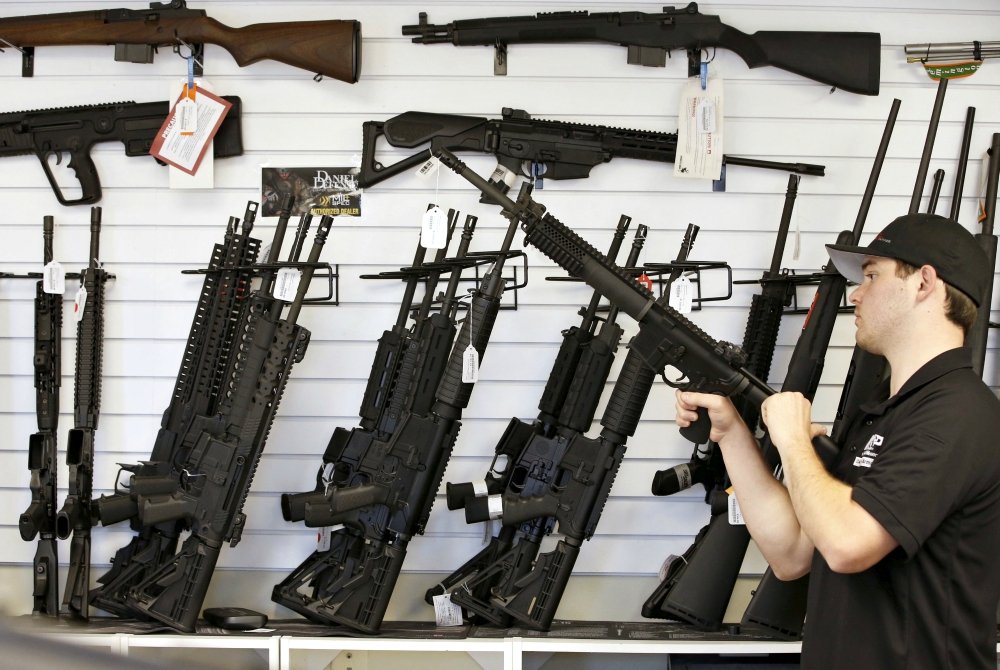
A salesman clears the chamber of an AR-15 in 2016 at a gun store in Provo, Utah. (CNS/Reuters/George Frey)
A total of 35,141 people die from gun violence in the United States each year, according to the Brady Campaign to Prevent Gun Violence, which averaged deaths over a five-year period through 2018. That's 96 people each day.
According to the center:
- 124,760 people are shot every year;
- 17,207 children and teens are shot every year;
- Seven children and teens die from gun violence in the United States every day.
Between 2000 and 2017, 250 FBI-designated "active shooter" incidents occurred in the United States.
There are more guns than people in the United States.
At the start of June, which is Gun Violence Awareness Month, the United States received its latest tragic reminders of the gravity and magnitude of the gun violence problem. In Virginia Beach, Virginia, a gunman killed 12 people while firing indiscriminately in an office building. In Chicago, 10 people were killed and 52 wounded in gun violence across the city during the weekend.
Since 1994, the U.S. bishops' conference has supported a number of "reasonable measures to address the problem of gun violence," including an assault weapons ban, universal background checks, and limitations on high-capacity weapons and ammunition magazines. With each successive mass shooting, bishops are quick to offer prayers and statements of their condolences.
However, as gun violence continues to affect and take thousands of lives each year, some Catholics are expressing a desire for a broader and more prophetic denouncement of American gun culture from the church across the board, laity and clergy alike.
Across the country, thousands of Americans are participating in a growing movement that calls for increased gun control legislation to save lives. The movement is primarily led by large-scale secular advocacy organizations like Everytown, Moms Demand Action, and the Brady Campaign and Center to Prevent Gun Violence.
Following the 2018 Stoneman Douglas High School shooting, student survivors provided a spark of energy and urgency to the movement, culminating in the March for Our Lives on March 24, 2018, in Washington, D.C. The wave of activism led by young people seemed to point toward a more inclusive movement that not only spotlighted mass shootings in predominantly white communities, but also everyday gun violence in predominantly minority low-income urban areas.
In a shift from past elections and a potential sign of the movement's growing influence, 2020 Democratic presidential candidates are now enthusiastically embracing gun control on the campaign trail.
Yet despite the momentum of the movement, church teachings, and dedicated work by many Catholic parishes and religious communities, some people still wonder why a fervent Catholic voice on gun violence is missing from the national discussion.
Church's relative silence
"In terms of these mass shootings, I've actually been stunned by the church's relative silence," said Susan Bigelow Reynolds, a professor of Catholic studies at Emory University's Candler School of Theology.
Reynolds, who studies lived theology in contexts of marginality and suffering, said theologically she understands "gun violence and the culture around it as a kind of idolatry" in which access to weapons of murder are privileged over the lives of people.
"Every successive mass shooting feels like another ritual sacrifice to the idol of the gun," she said.
Reynolds said she sees the way American gun culture is approached from the altar as "very uncritical."
'Every successive mass shooting feels like another ritual sacrifice to the idol of the gun.'
—Susan Bigelow Reynolds
"It seems more about consoling victims than it is about denouncing the idolatry that is at the heart of our national obsession with gun rights," Reynolds said of the official church's consistent response to gun violence. "I've certainly never heard that kind of pronouncement made by a Catholic leader, let's say, within a homily."
Following the Virginia Beach shooting, Bishop Frank Dewane of Venice, Florida — chairman of the U.S. bishops' Committee on Domestic Justice and Human Development — released a brief statement that read in part: "Action is needed to attempt to reduce the frequency of these abhorrent acts through legislation and training." Dewane used nearly the exact same language, word for word, in a statement after the school shooting in Colorado last month.
When asked if Dewane could expand on what he meant by "frequency," a media contact at the U.S. Conference of Catholic Bishops simply directed NCR to the conference's backgrounder on the issue of gun violence.
Tobias Winright, a moral theologian at St. Louis University who used to work in law enforcement and is currently writing a book related to gun violence, said he, too, like Reynolds, questions why more high-profile, widely available statements are not issued by clergy.
"These statements are there but one has to search for them, and that's unfortunate," he said.
Winright said that prominent bishops like Cardinal Blase Cupich of Chicago have made important pronouncements in the wake of mass shootings, "but it needs to be more organized" and convey "more of the urgency of this problem."
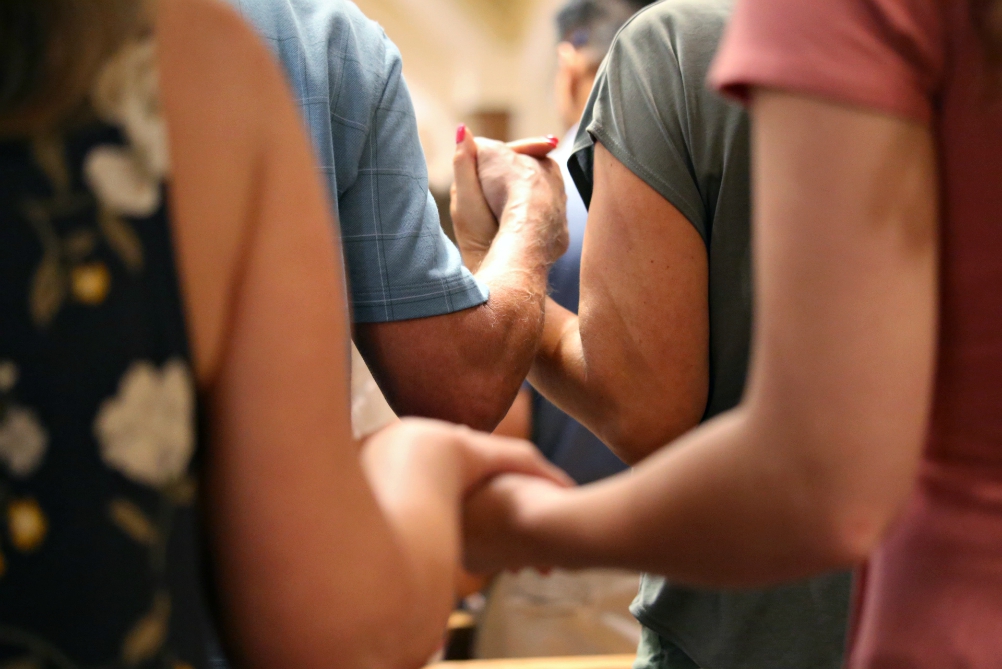
Faithful pray June 2 at St. John the Apostle Church in Virginia Beach, Virginia. Two days earlier, 12 people were killed by a gunman at the city's Municipal Center. Among the victims was Mary Lou Gayle, a member of the parish. (CNS/The Catholic Virginian/Deborah Cox)
In 2019, the Sisters of St. Francis of Philadelphia took a corporate stand on behalf of gun safety reform, "thereby committing to educate ourselves and others toward a culture of life." The sisters have taken a number of action steps, such as participating in local witness events, advocating for background checks, and voting to elect officials who support gun safety reform.
Sr. Kate O'Donnell, the congregation's East Coast coordinator for its Justice, Peace and Integrity of Creation Committee, noted the work many individual parishes and congregations of women religious do on gun violence prevention. Nevertheless, she told NCR she would still like to see more of the church commit itself to this issue nationally.
"I believe if Jesus, the epitome of nonviolence, walked our earth today he would not hesitate for one minute to speak to the issue of gun violence," she said. "Unfortunately, this kind of preaching seems to be silent in our church as a whole."
Getting the word out
Nancy Grogan — a Catholic, lawyer and longtime gun-reform advocate from Philadelphia — has been similarly struck by the church's reluctance to seriously engage with gun violence. "As laity we know our catechism. We may not be nuanced in all the particulars of the theology, but we do know that there are certain principles of Catholic social teaching that apply and we have an obligation to be thinking about this and coming up with solutions," said Grogan.
Winright gave a similar assessment: "We don't necessarily have to wait for the bishops on this. Because we're all baptized Christians, we all have a calling to lift our voices."
The issue of gun violence connects to Catholic social teaching both in regards to human dignity and responsibility to the common good, said the theologian. Despite church teachings on the right to self-defense that goes back to Aquinas, "there's nothing I've seen anywhere that says you have a right to a gun."
"We have a responsibility to be there for our brothers and sisters, to be neighbors, to be there to protect the other, but all is with an eye towards a wider responsibility towards the common good," Winright said. "And if a specific right puts at risk that common good and the rights of others, then that's going to be especially scrutinized in the Catholic tradition."

A memorial dedicated to victims of gun violence is displayed Nov. 4, 2017, during a Day of the Dead vigil at St. Agnes of Bohemia Catholic Church in Chicago. (CNS/Joshua Lott)
Winright noted that guns not only threaten lives through mass shootings and urban gun violence, but also through suicides — which make up more than 21,000 gun-related deaths per year, creating a serious health care consideration.
"How do we address that? More guns? That doesn't seem to be the answer," Winright said.
Through her work with local and statewide organizations over the years, Grogan noticed the Catholic Church was "seriously unrepresented" at the numerous gun-reform conferences, gatherings and initiatives she attended with faith leaders.
Believing the movement needed a "distinctly Catholic voice" due to the church's scholarly tradition and dedication to good works, Grogan created the website and social media platform Philadelphia Catholics for Fewer Guns in 2015. This past December, she expanded her website by launching the "Malchus Project" as an education initiative on the Catholic perspective on gun policy.
Grogan hopes the Malchus Project can eventually evolve into a forum for research, study and reflection on the "rich reservoirs of Catholic social teaching as it applies to this particular issue." She said the team's first order of business, however, is to effectively "get the word out there" to the project's nearly 900 Facebook followers that Catholic teachings on gun violence even exist.
"My experience as both a Catholic and gun reform advocate working in gun violence prevention has been a really surprising realization that many Catholics don't even know that there is a Catholic teaching on the issue of guns," Grogan said. "I think a lot of people don't know that the Catholic Church is consistently advocating for more restrictive gun policy."
Travis Brock, a proud gun owner and self-employed consultant in the energy industry from Kansas, said he was unaware of the bishops' policy positions and he has never heard a priest preach about guns or gun violence.
'I believe every person has the right to self-defense; if not, how anti-life is that?'
—Travis Brock
Living on a farm in Kansas, Brock grew up around guns and joined the National Rifle Association as an adult. He told NCR that his position on guns — which is against stricter controls by the government — stems from his respect and reverence for the Second Amendment as a protection against possible tyranny and his belief as a Catholic that protecting oneself and family is an inherent right and fundamentally "pro-life."
"If you're pro-life across the board, what's more important than your own life?" said Brock. "I believe every person has the right to self-defense; if not, how anti-life is that?"
Brock expressed frustration with advocates for stricter gun control who, he believes, manipulate certain statistics or ignore serious underlying issues of gun violence, like debilitating poverty and mental health.
When asked what Catholics who are looking to get involved in this issue should consider, Brock cautioned against being too "emotional" and trying to ban all rifles "because they're scary," a response he does not consider a logical solution. He also said that a quick way to shut down any serious conversation is by "vilifying" gun owners.
"If one of my No. 1 responsibilities is to keep myself and my family safe, but then I've got somebody saying they need to take my stuff away because it's a threat to the world — I don't think they understand the deep-rooted stance that they're taking," Brock said.
Raising the profile
The Pax Christi chapter at St. John Neumann Parish in Reston, Virginia has been working on the issue of gun violence for the past two years through annual vigils and lobbying elected officials in Virginia. Bob More, a retired lawyer and member of the chapter, said that he also has noticed a certain level of ignorance about official church teachings and positions among ordinary Catholics at his parish.
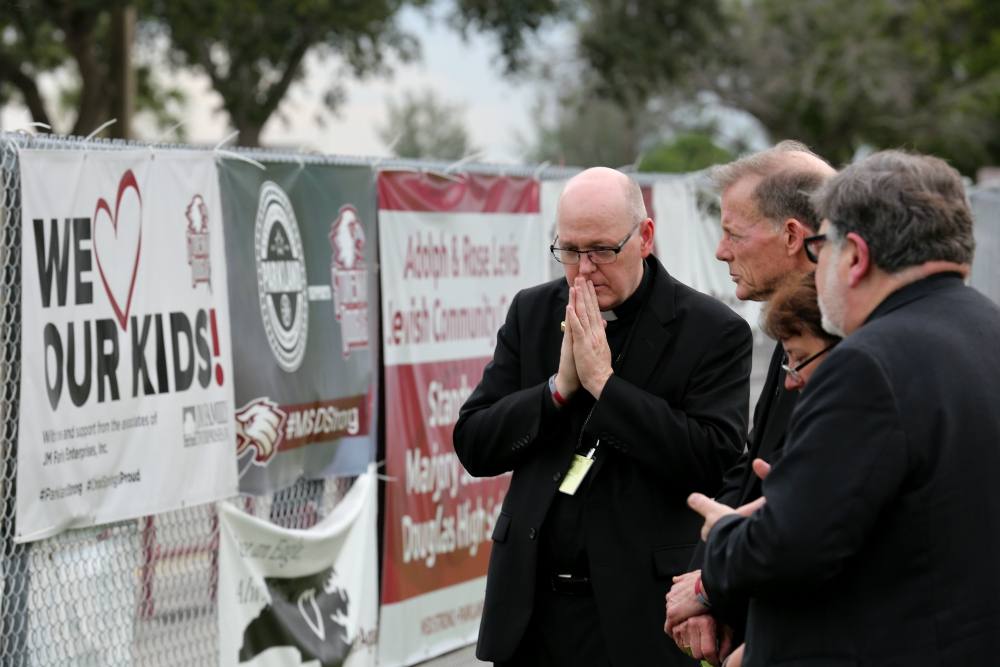
On June 14, 2018, outside Marjory Stoneman Douglas High School in Parkland, Florida, representatives of the U.S. Conference of Catholic Bishops pray for the victims of a shooting at the school in February of that year. The bishops were in the state for their annual spring assembly. (CNS/Bob Roller)
More told NCR that his group met in April with Michael O'Rourke, a policy adviser for the bishops' conference who works on gun violence, to discuss possibilities of raising the profile of the issue throughout the church in the U.S.
According to O'Rourke, he explained to More's group that the bishops' conference had certain limitations in terms of advocacy because its work is at the federal level, where it "doesn't look like there is going to be major gun policy changes in Congress." O'Rourke suggested Catholics wanting to get involved might look to their state Catholic conferences, because there is more movement currently at the state level.
More said that another idea they discussed at the meeting was some type of grassroots organization that mobilizes Catholics around the specific issue of gun violence in relationship with, but not directly connected to, the bishops' conference — comparable to the Catholic Climate Covenant on environmental issues or Catholic Mobilizing Network on death penalty issues. O'Rourke said he thought that if Catholics wanted to engage seriously with this issue the bishops' conference would "welcome a relationship."
What Catholic organizing might look like
Sharon Erickson Nepstad, a distinguished professor of sociology at the University of New Mexico and author of Catholic Social Activism: Progressive Movements in the United States, said that many secular organizers around gun reform may not see Catholics as a "natural ally" but that they could be because of Catholics' commitment to protecting life.
According to Nepstad, there is a longstanding history — sometimes overlooked by secular groups — of progressive Catholics working on consistent ethic of life through a range of issues. This history includes progressive issues like caring for refugees and migrants, mobilizing around the death penalty, and actively participating in the labor movement.
She said gun safety reform is part of that storyline and part of being "pro-life, if you will, but most people never think about it in those terms."
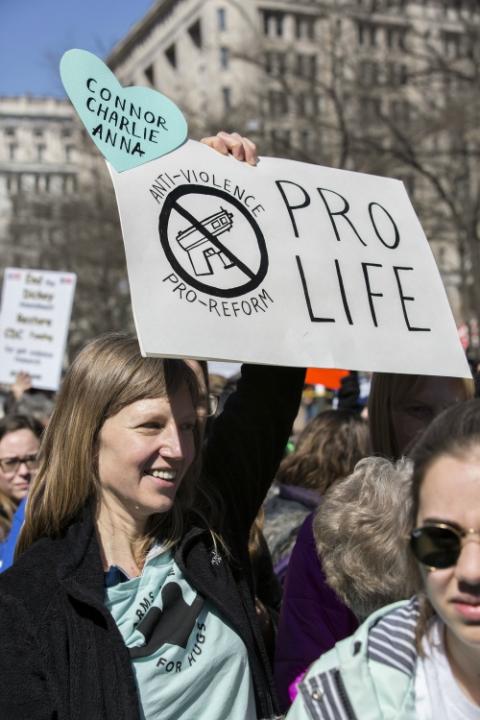
A woman holds a sign during the March for Our Lives event in Washington March 24, 2018. (CNS/Catholic Standard/Jaclyn Lippelmann)
Nepstad cited the Catholic Worker tradition and the United Farm Workers as examples where Catholics were able to join existing secular movements and create distinctly Catholic identities and campaigns within those movements. Historically, there have been some tensions between Catholics and broader movements because Catholics have been uncomfortable at times with tactics that may not align with their faith or because they preferred action aimed at pulling other Catholics into the movement.
Inversely, Nepstad said Catholic opposition to abortion may make some secular organizers uneasy about collaborating, but there are still clear common ground and advantages to bringing Catholics into the fold. As a social movement scholar, Nepstad said that Catholics historically contributed important material resources like money and meeting locations, an infrastructure to mobilize people, and a degree of moral credibility to social movements they participated in.
Catholic activist tradition also has a unique legacy of intense sacrifice, such as Plowshares activists going to jail for multiple years to protest the nuclear arms race.
Catholic activism "brings not just that altruism but a willingness to sacrifice and a willingness to persist," said Nepstad. "People continued to do this even when they were not seeing a lot of success because they were motivated by their own religious beliefs and faith that this was the right thing to do regardless of the outcome."
"Persistence" will be important if Catholics more fully enter a gun violence prevention movement, which has not seen major national gun-reform legislation in decades.
When thinking about an issue that is truly life or death, "sacrifice" might be more complicated for Catholic activists to contemplate.
The notion of sacrifice has been on the mind of Susan Bigelow Reynolds a lot recently. After the Colorado shooting in May, her social media feeds were full of posts — including from fellow Catholics — with Bible quotes celebrating the student who was killed tackling the gunman. In those posts, she's starting to see a disturbing, dangerous and distracting narrative around the idea of "sacrificial love."
"That kind of selflessness should move us, obviously, but on a deeper level it should horrify us," Reynolds said. "Our lawmakers have left our children for dead, right? They've left them to fend for themselves. I can think of no more thorough failure of moral leadership really than what we're witnessing right now."
Advertisement
[Jesse Remedios is an NCR Bertelsen intern. His email address is jremedios@ncronline.org.]





